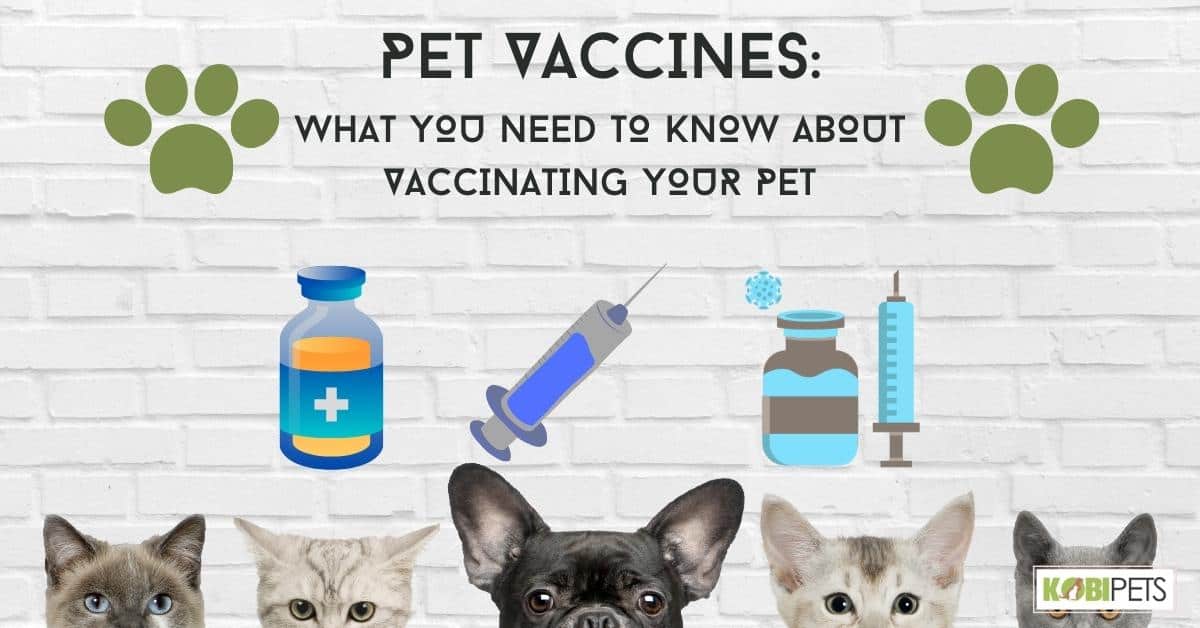
Each pet has unique needs and a vaccine schedule tailored to those needs is an important part of keeping your pet healthy. Vaccinating your pet not only safeguards them from potential diseases but also protects the people in their life.
Pet vaccines protect against serious diseases and are an important part of responsible pet ownership. Types of vaccines include rabies, distemper, parvovirus, and feline leukemia. Recommendations vary by breed, age, and health. Frequency is typically annually or every 3 years.
Whether you’re just starting out as a pet owner, or you need a refresher on staying up-to-date with further immunizations, use this guide to ensure that your four-legged family member gets the best care possible.
Importance of Pet Vaccination
Pet vaccinations are essential to the well-being of animals and humans alike. Vaccines protect pets from dangerous, potentially fatal ailments and diseases, while also helping to prevent the spread of such contagions in our homes, amongst other pets, and even from us to other humans. Vaccinations stimulate a pet’s own immunity response which then produces antibodies that can fight off illnesses.
Pet vaccination is an essential aspect of pet care and is crucial in protecting the health and well-being of your furry friend. Here are a few reasons why pet vaccination is important:
- Protects against deadly diseases: Vaccination helps protect your pet against deadly and contagious diseases such as rabies, distemper, and parvovirus, to name a few. These diseases can be fatal and spread rapidly from pet to pet, making vaccination an important line of defense.
- Prevents the spread of diseases: By vaccinating your pet, you are not only protecting your pet but also reducing the risk of disease transmission to other animals and people.
- Cost-effective: Vaccination is a cost-effective way to protect your pet’s health, as it is less expensive than treating a serious illness or disease.
- Peace of mind: With regular vaccination, you can have peace of mind knowing that your pet is protected against common diseases.
- Keeps pets healthy: Regular vaccination helps ensure that your pet remains healthy, strong, and active. It boosts their immune system and helps prevent the onset of diseases.
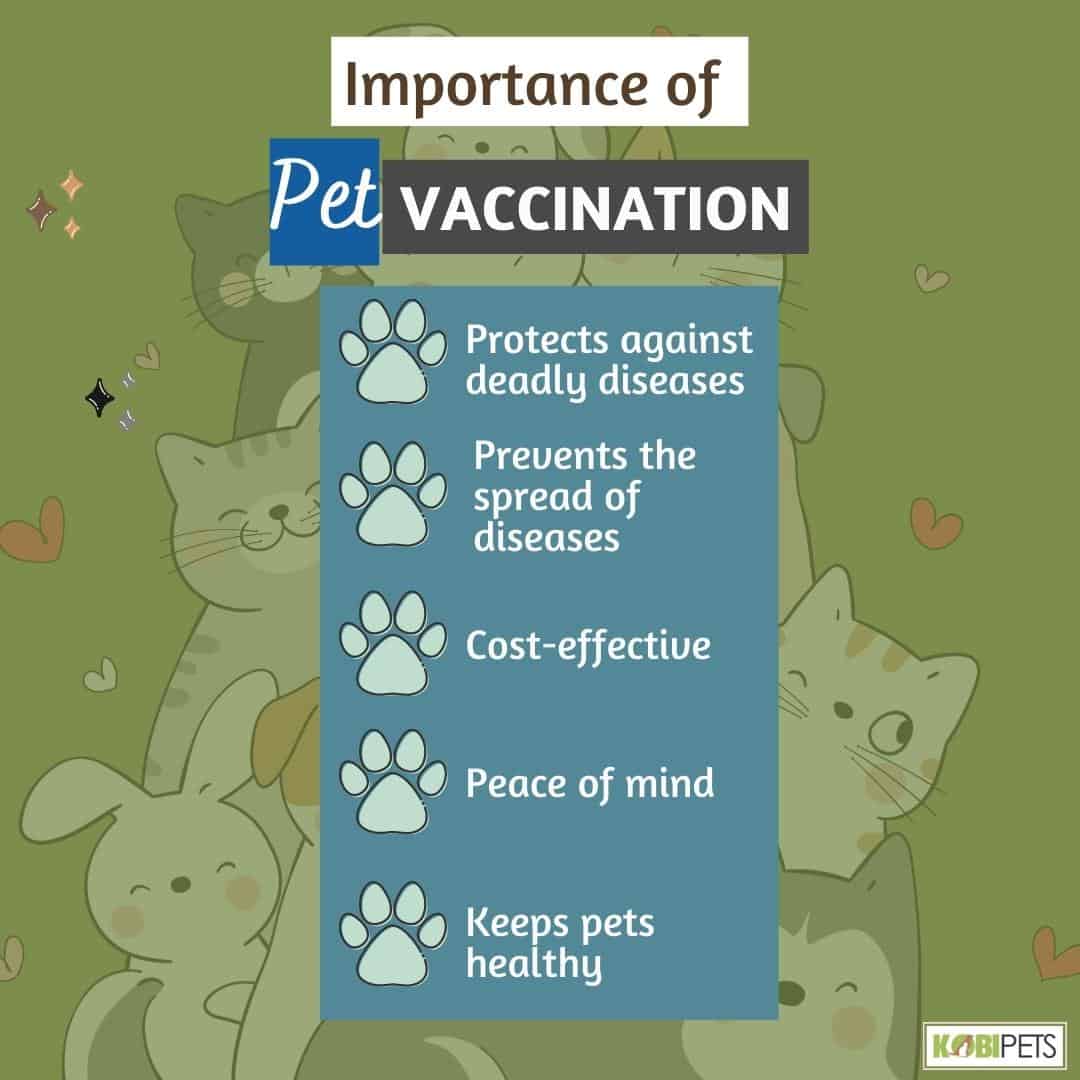
Importance of Pet Vaccination
Types of Pet Vaccines
Vaccines are necessary for any pet to ensure a healthy and long life. Most pet owners may be familiar with the main vaccines their pet will need, such as rabies, distemper, and parvovirus, but there are other vaccines available that can help pets avoid other illnesses or diseases more specific to certain animals or environments.
- Rabies Vaccine: This vaccine is required by law in most countries and is given to protect against rabies, a deadly virus that is transmitted through bites from infected animals.
- Distemper Vaccine: This vaccine protects against canine distemper, a highly contagious virus that affects dogs.
- Parvovirus Vaccine: This vaccine helps protect against parvovirus, a highly contagious and potentially fatal disease that affects dogs.
- Feline Leukemia Vaccine: This vaccine is recommended for cats that go outdoors and are at a higher risk of exposure to the feline leukemia virus.
- Feline Panleukopenia Vaccine: This vaccine protects against feline panleukopenia, a highly contagious and potentially fatal disease that affects cats.
- Feline Upper Respiratory Vaccine: This vaccine helps protect against common felines’ upper respiratory infections such as feline calicivirus and feline herpesvirus.
- Lyme Disease Vaccine: This vaccine is recommended for dogs that live in areas where Lyme disease is prevalent.
- Canine Influenza Vaccine: This vaccine helps protect against canine influenza, a highly contagious respiratory disease that affects dogs.
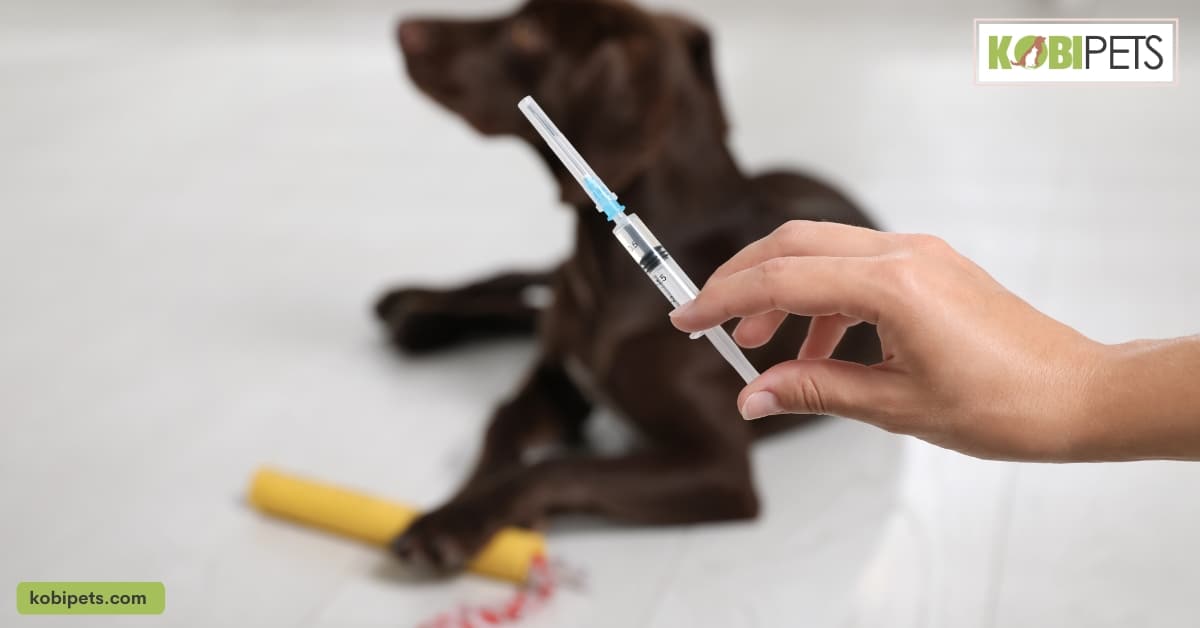
Vaccination Schedule
Vaccination of pets is an important part of a pet’s health and wellness plan. Depending on the type of pet, their lifestyle, and any potential risks from their environment or contact with other animals, pet owners should consult with a veterinarian for the specific vaccination schedule for their animal.
Vaccinating your pet maintains their immunity to diseases like rabies, parvovirus, and distemper. Many veterinarians recommend puppies and kittens receive a series of vaccinations within the first year of life to maximize immunity.
As they age, pets may need follow-up shots and boosters every one to three years. Additionally, certain breeds or animals at risk may benefit from additional preventive vaccines such as canine influenza, Lyme disease, or leukemia.
By establishing a vaccination schedule tailored to your pet’s needs and monitoring them through vet checkups and updated vaccinations, pet owners can ensure their furry friend lives a long healthy life!

Recommended Ages for Pet Vaccination
Pets are an increasingly important part of many families, and providing them with the best care is paramount. Vaccinations for your pet can help protect against diseases that can be fatal if left untreated. Knowing which vaccinations your pet needs and at what age is an important part of keeping them healthy.
| Species | Vaccine | Age |
|---|---|---|
| Puppy/Kitten | First vaccine | 6-8 weeks |
| Puppy/Kitten | Follow-up shots | Every 3-4 weeks until 16 weeks of age |
| Adult Dog | Rabies | Every 1-3 years, depending on local laws and veterinarian recommendation |
| Adult Dog | Distemper | Every 1-3 years, depending on the veterinarian’s recommendation |
| Adult Dog | Parvovirus | Every 1-3 years, depending on the veterinarian’s recommendation |
| Adult Cat | Rabies | Every 1-3 years, depending on local laws and veterinarian recommendation |
| Adult Cat | Distemper | Every 1-3 years, depending on the veterinarian’s recommendation |
| Adult Cat | Leukemia | Every 1-3 years, depending on the veterinarian’s recommendation |
Frequency of Pet Vaccinations
The frequency of pet vaccinations varies depending on the type of vaccine and the animal species. Here are some general guidelines for pet vaccination frequency:
- Puppies and Kittens: Puppies and kittens typically receive a series of shots every 3 to 4 weeks until they reach 16 weeks of age. After this, boosters are given annually or every 3 years, depending on the vaccine and the veterinarian’s recommendation.
- Adult Dogs: The frequency of vaccinations for adult dogs varies depending on the type of vaccine and local laws. Rabies vaccines are typically given every 1 to 3 years, while distemper and parvovirus vaccines are usually given every 1 to 3 years, based on the veterinarian’s recommendation.
- Adult Cats: The frequency of vaccinations for adult cats also varies depending on the type of vaccine. Rabies vaccines are typically given every 1 to 3 years, while distemper and leukemia vaccines are usually given every 1 to 3 years, based on the veterinarian’s recommendation.
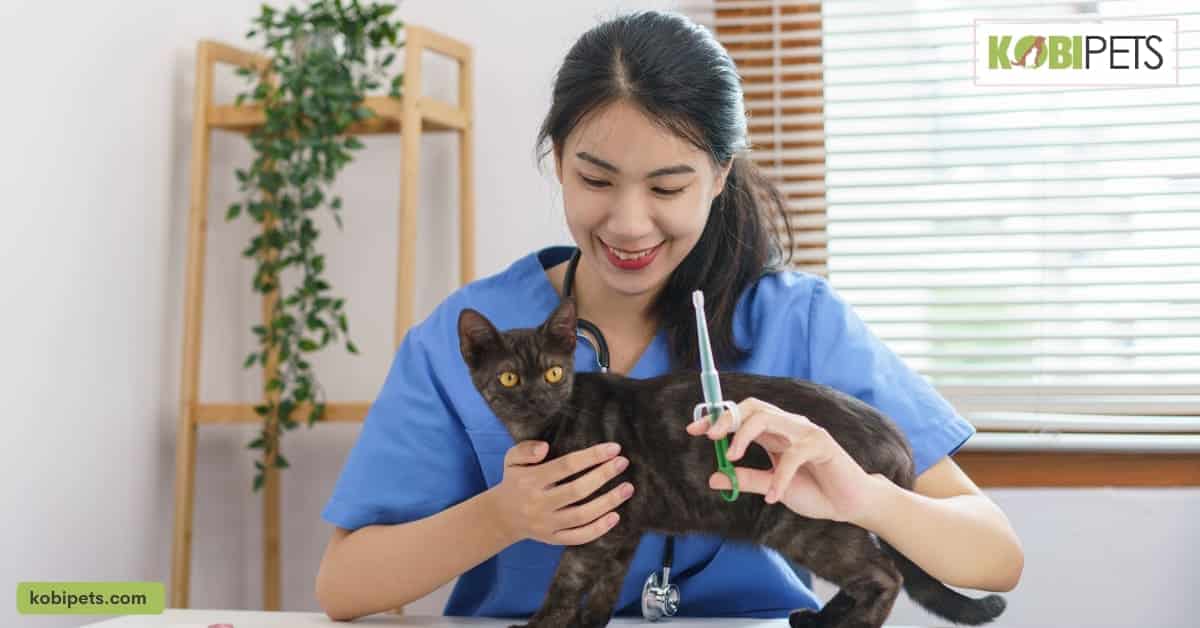
Importance of Sticking to a Vaccination Schedule
Vaccinating your pet is an important step in ensuring the safety and well-being of your beloved companion. Regular vaccinations can help protect pets against serious and potentially fatal diseases, so it is essential to adhere to a regular schedule set out by certified veterinary professionals.
Certain vaccines may be required for entry into kennels and groomers, as well as for international travel, making adhering to regular vaccinations even more important.
Vaccines work in two ways – firstly by introducing elements from the disease-causing organism with reduced strength; the body then gains immunity which helps to protect against the real disease or infection.
An additional benefit of frequent vet visits when vaccinating pets is that it allows for regular check-ups where any health issues can be identified early on and treated appropriately.
Simply put, sticking to a vaccination schedule for our furry friends can make a huge difference in maintaining their long-lasting health.
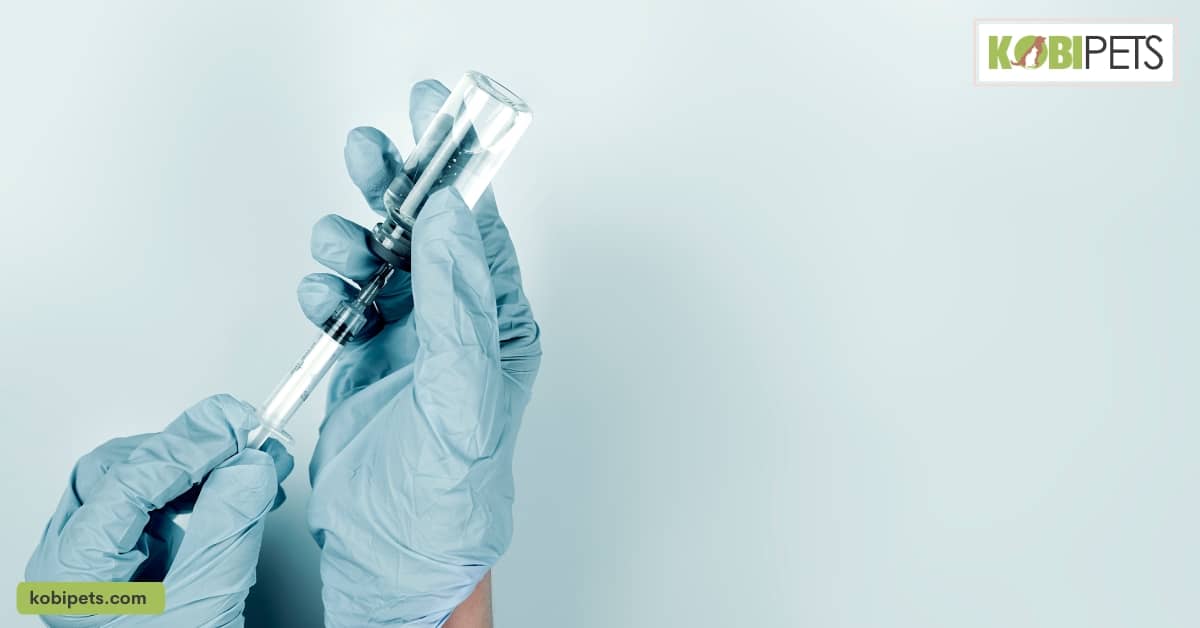
Potential Risks and Side Effects
Like any medical procedure, pet vaccinations can carry some risks and side effects. However, the benefits of vaccinating your pet far outweigh the potential risks. Some of the potential risks and side effects of pet vaccinations include:
- Pain or swelling at the injection site: This is the most common side effect of pet vaccinations and is usually mild and temporary.
- Fever: Some pets may develop a low-grade fever after being vaccinated, but this is also typically mild and temporary.
- Loss of appetite or lethargy: Some pets may experience a temporary loss of appetite or become lethargic after being vaccinated, but this is typically short-lived.
- Allergic reactions: In rare cases, pets may have an allergic reaction to one of the components of the vaccine. Symptoms of an allergic reaction can include itching, hives, swelling, and difficulty breathing.
- Autoimmune disorders: In extremely rare cases, pet vaccinations have been linked to the development of autoimmune disorders, such as autoimmune hemolytic anemia.
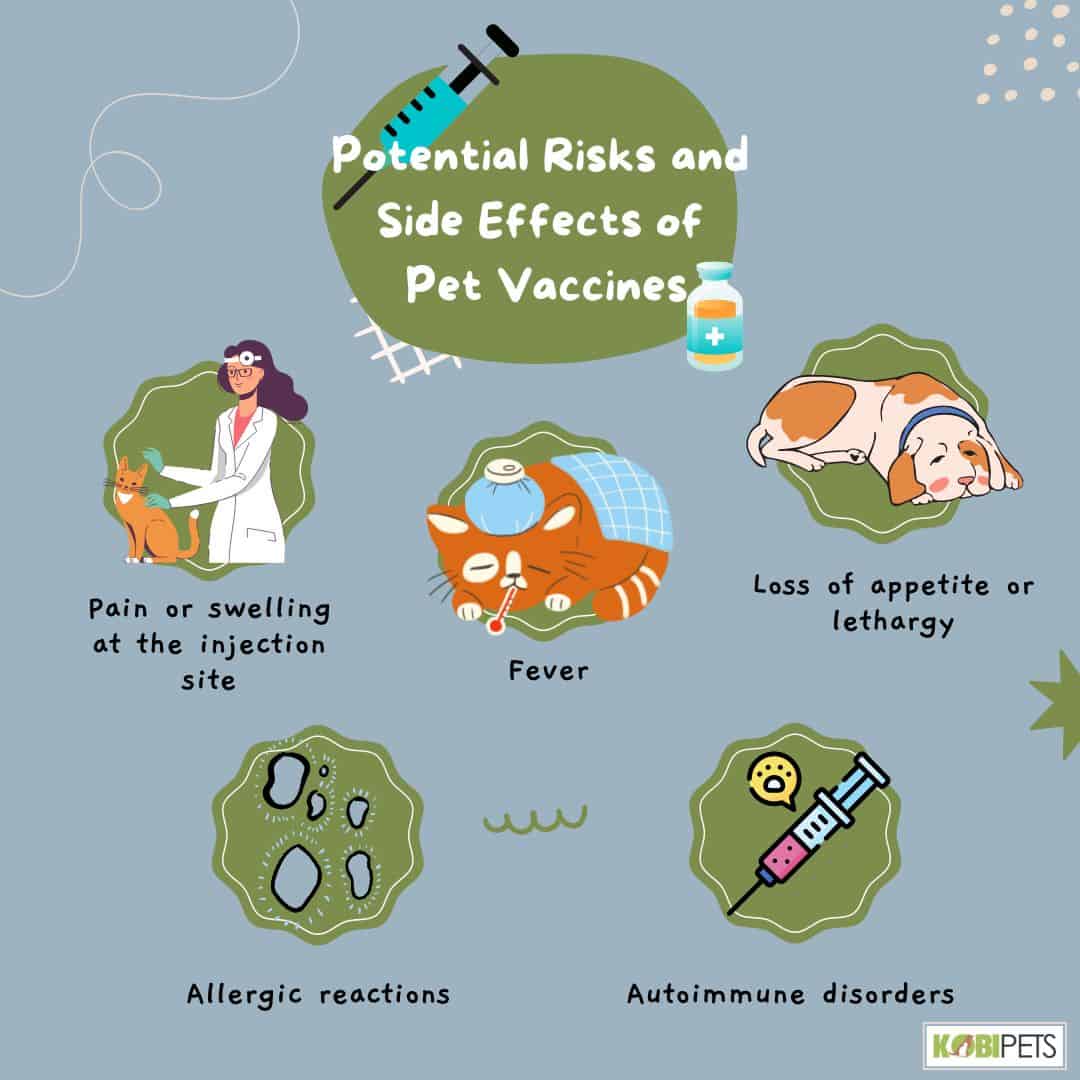
Potential Risks and Side Effects
In conclusion
While pets, like humans, will never be fully immune to every disease or illness that exists, the use of vaccines is a proven tool for protecting our furry friends from preventable illnesses.
Following the vaccination protocols recommended by your veterinarian can ensure that your pet is protected from illnesses and also has a long and healthy life.
Vaccinating your pet may require time, money, and in some cases energy; however, the benefits greatly outweigh these sacrifices as there is no substitute for the peace of mind of knowing that you have taken proactive steps in protecting your beloved pet’s health.






